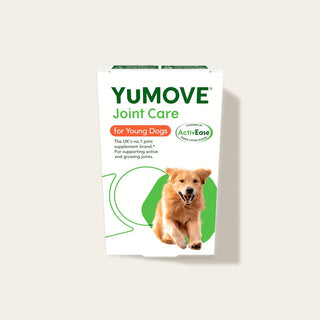

Dogs are a lot older than we think - why the seven year rule is a myth!
According to the PDSA’s Animal Wellbeing Report, 53% of UK adults owned a pet in 2023, with 29% owning a dog – meaning that the nation is rich in dog lovers! So, you’d expect a lot of canine general knowledge to be floating around. Unfortunately, it might not all be as reliable as you’d hoped.
For example, did you know that one human year isn’t actually equal to seven dog years, despite popular belief?
Let’s take a closer look…
Research conducted by Ideker and colleagues on Labrador retrievers found that a key epigenetic marker of ageing showed a ‘non-linear’ relationship between dog and human ageing. In other words, there’s no simple and direct parallel between a year in our lives, and a year in our canine companions’ lives.
Strangely enough, our dogs appear to age much faster in their earlier years, before their rate of ageing slows down.
Drawing from this data, the study authors determined that a one-year-old dog was about equivalent to a 10-year-old human, while a four-year-old dog was equivalent to a human just over the age of 50.
At the same time, though, a 10-year-old dog was only equivalent to a human of about 65.
While it’s worth remembering that this study was focused on one particular dog breed, and likely won’t have accounted for all aspects of ageing, it still offers some interesting insight!
An insight into your dog's life stages
Whilst the biological age of a dog can vary depending on the size and specific breed of the individual, pinpointing which stage of life your dog is at is much more straightforward.
Like humans, a dog’s life cycle features a series of stages, such as puppy, adolescent and senior.
Compared to a human's complex nine-stage life cycle, a dog’s life cycle comprises just four main stages. These stages are puppy, adolescent, adult dog, and senior.
Puppy: 0-18 months old (ages vary on breed)

The puppy stage is the first stage of a dog’s life cycle, beginning at birth and lasting until they are anywhere from 6-18 months old.
Puppies are born blind, deaf and unable to regulate their own body temperature. However, at around 2-4 weeks, they slowly start being able to see, hear, stand up and move around a little.
As their senses further develop and their curiosity broadens, they will start to take in their surroundings and discover things on their own.
The puppy stage is the best time to house-train your furry friend and ensure that they don’t pick up any bad habits This will save time - and mess - rather than trying to teach them further down the line.
It is also essential to ensure that puppies receive the recommended vaccinations at the proper times, to prevent them from catching any diseases while at their most vulnerable.
Adolescent dog: 6-18 months (ages vary on breed)

The second stage of a dog’s life cycle is adolescence, which occurs sometime between 6-18 months.
Just like a human's teenage years, this is a time of growth spurts, hormonal and physical changes.
During adolescence, you may notice that your dog is reluctant to pay attention and is likelier to exhibit uncharacteristic ‘problem behaviour.’
However, good behaviour can be maintained with a solid commitment to positive behavioural training. The effort you put in here will remain with your dog for the rest of their lives, so keep it up!
Adolescence is also the stage of life where dogs reach sexual maturity. This means female dogs will go into heat and be able to have puppies, while male dogs will become more interested in females, and in marking their territory by sniffing or urinating.
Although your dog will be in their prime at this stage, it's never too early to start considering some additional support for their joints. Our joint supplements for dogs range features products tailored to serve our canine companions at every stage of life.
Adult dog: 1-6 years (ages vary on breed) 
Between the ages of 1-3, your dog is considered to have reached adulthood.
Relative to adolescent dogs, adult dogs typically become easier to manage, and their previous training pays off more visibly. Typically, this is a time when dogs are used to their surroundings and know what is and isn’t acceptable behaviour.
By this stage, you may notice your dog showing some signs of ageing (and potentially joint stiffness), such as:
-
Being less excitable and/or playful
-
Sleeping more often and for more extended periods of time
-
Finding it challenging to get up after resting
-
Slowing down and taking longer whilst out on walks
Senior dog: 6-10 years (ages vary on breed) 
Dogs enter their senior years roughly between the ages of 6-10, depending on their breed.
During this stage, dogs may show signs of slowing down and may require more sleep. And when it comes to walkies, it’s best to opt for short and sweet outings, at regular intervals. Several shorter walks will generally be easier on your senior dog than one long one – and will help keep their day interesting, too.
Some professional dog walkers offer shorter walks at regular intervals, specifically for senior pups.
As your dog ages, they will start to produce less Glucosamine and Hyaluronic Acid. Glucosamine helps keep joints healthy by supporting the strength and integrity of joint structures. Hyaluronic Acid is distributed widely throughout connective, epithelial, and synovial fluid. If the levels of Glucosamine and HA are insufficient, dogs are more likely to experience joint stiffness.
A high-quality joint supplement such as YuMOVE Joint Care PLUS Max Strength contains important ingredients such as Hyaluronic Acid and Glucosamine. It can help to support mobility in older dogs with joint stiffness.
Regular vet visits are vital to ensure your senior dog receives the proper care as they age.
An active life, for life
Whether human or canine, ageing is a natural process that affects everyone – but it doesn’t have to change yours or your dog's zest for life!
The YuMOVE Joint Care range has been specially formulated to help dogs lead their most active lives, for life – and you can expect to see the difference in just 6 weeks, or your money back guaranteed.*
From YuMOVE Joint Care for Young Dogs to YuMOVE Joint Care for Adults Dogs, YuMOVE Joint Care PLUS for Dogs, and YuMOVE Joint Care PLUS Max Strength for Dogs, we’ve got a great supplement to support your pup at every stage of life.



